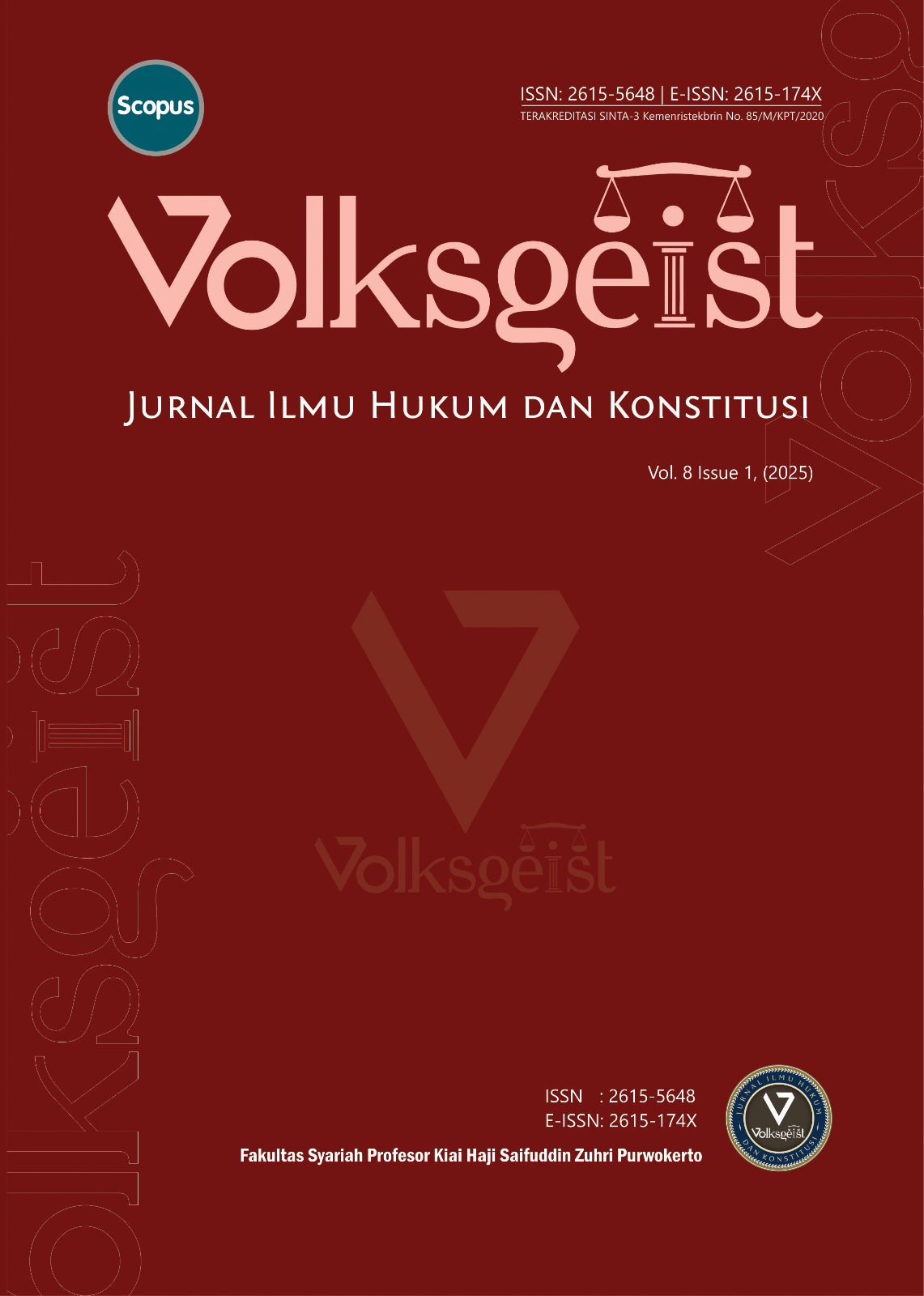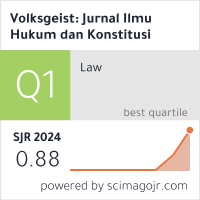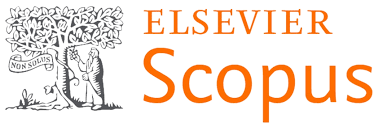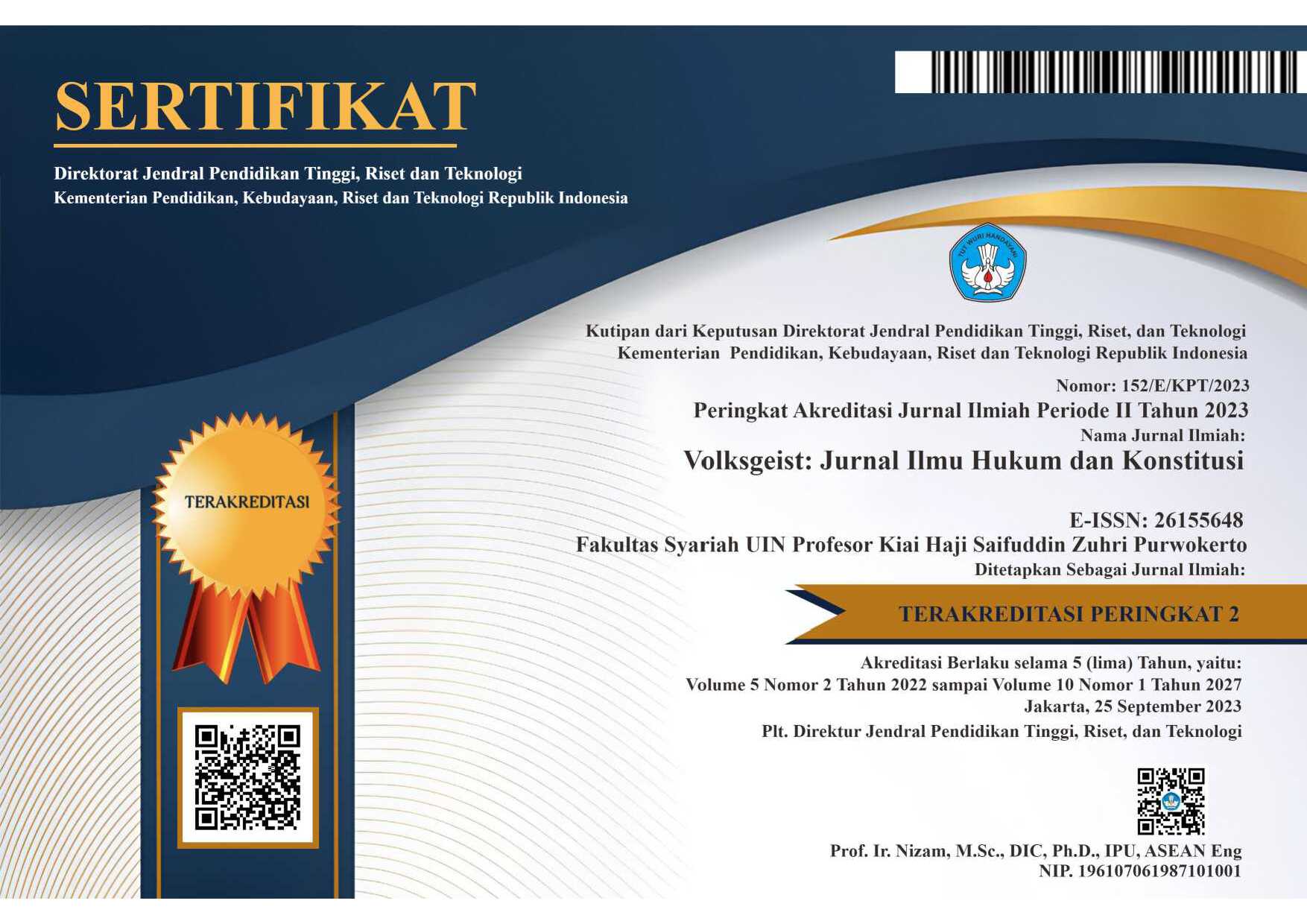Non-Judicial Activities of the Indonesian Constitutional Court: Do They Foster Judicial Reputation?
DOI:
https://doi.org/10.24090/volksgeist.v8i1.12239Keywords:
Constitutional court; non-judicial activities; independence.Abstract
The Indonesian Constitutional Court is defined as a judicial body with specific competencies as stated in the 1945 Constitution. Given its significance and the heightened attention it receives from the public, the rulings of independent courts and impartial judges are vital for maintaining the reputation of the Indonesian judiciary and the public's confidence in its work. In addition to adjudicating cases, the Constitutional Court and its judges are involved in various non-judicial activities. This research article explores the reasons behind the Constitutional Court’s engagement in these activities, outlines the various types of non-judicial actions, and evaluates their effect on the court's reputation. The aim of this research is to establish a conceptual framework and assess the influence of non-judicial activities on judicial reputation by utilizing conceptual, statutory, and comparative frameworks, supported by empirical data from official documents.Top of Form The results show that the court participates in non-judicial activities to obtain benefits like increased popularity, public interest, visibility, preventing its decisions from being overturned by other judicial entities, and enhancing its reputation and influence. Often, these activities involve promoting the court's work to both local and international judicial communities to foster dialogue and connections with similar courts and stakeholders. Furthermore, non-judicial activities can influence public interest and engagement. While these initiatives benefit the institution, judges, and the public, they do not inherently improve the Constitutional Court's reputation, as its standing fundamentally relies on the quality of its decisions and its credible independence, impartiality, and integrity.Downloads
References
Agnes, Michael, ed. Webster’s New World College Dictionary. 4. ed. [Nachdr.]. Cleveland, Ohio: Wiley, 2010.
Ahmad, Ahmad, Fence M. Wantu, dan Dian Ekawaty Ismail. “Convergence of Constitutional Interpretation to the Test of Laws Through a Constitutional Dialogue Approach: Konvergensi Penafsiran Konstitusional Terhadap Pengujian Undang-Undang Melalui Pendekatan Constitutional Dialogue.” Jurnal Konstitusi 20, no. 3 (1 September 2023): 514–35. https://doi.org/10.31078/jk2038.
Baraḳ, Aharon. The Judge in a Democracy. 1. paperback print. Princeton, NJ: Princeton Univ. Press, 2008.
Bassok, Or. “The Schmitelsen Court: The Question of Legitimacy.” German Law Journal 21, no. 2 (2020).
Beatson, Jack. “Should Judges Conduct Public Inquiries.” Israel Law Review 37, no. 2–3 (2004).
Bell, Peter Alan. “Extrajudicial Activity of Supreme Court Justices.” Stanford Law Review 22, no. 3 (1970).
Bittker, Boris I. “Interpreting The Constitution: Is The Intent of The Framers Controlling? If Not, What Is?” Harvard Journal of Law and Public Policy 19, no. 1 (1996).
Bouvier, John. A law dictionary, adapted to the Constitution and laws of the United States of America, and of the several states of the American union: with references to the civil and other systems of foreign law. 2nd ed. Clark, N.J: Lawbook Exchange, 2004.
Bryan A. Garner. Black’s Dictionary. 9th ed. Thomson Reuters business, 2009.
Chakim, M. Lutfi. “A Comparative Perspective on Constitutional Complaint: Discussing Models, Procedures, and Decisions.” Constitutional Review 5, no. 1 (2019).
Constitutional Court of Germany. “2021 Annual Report of The German Constitutional Court,” 2021.
———. “2022 Annual Report of The German Constitutional Court,” 2022.
———. “BVerfGE 2835/17.” The Federal Constitutional Court, 2020. https://www.bundesverfassungsgericht.de/SharedDocs/Entscheidungen/EN/2020/05/rs20200519_1bvr283517en.html.
Dothan, Shai. Reputation and Judicial Tactics: A Theory of National and International Courts. New York: Cambridge University Press, 2015.
Dubeck, Leslie B. “Understanding ‘Judicial Lockjaw’: The Debate over Extrajudicial Activity.” New York University Law Review 82, no. 2 (2007).
Ekins, Richard. Judicial Power and the Balance of Our Constitution: Two Lectures by John Finnis. London: Policy Exchange, 2018.
Epstein, Lee, William M. Landes, dan Richard A. Posner. The Behavior of Federal Judges: A Theoretical & Empirical Study of Rational Choice. Massachusetts: Harvard University Press, 2013.
Epstein, Lee, dan Keren Weinshall. The Strategic Analysis of Judicial Behavior. Cambridge: Cambridge University Press, 2021.
European Court of Human Rights. Big Brother Watch and Others v. The United Kingdom (2021).
———. CENTRUM FÖR RÄTTVISA v. SWEDEN (2021).
Faiz, Pan Mohammad. “A Prospect and Challenges for Adopting Constitutional Complaint and Constitutional Question in The Indonesian Constitutional Court.” Constitutional Review 2, no. 1 (2016).
FELDMAN, NOAH R. SULLIVAN, KATHLEEN M. CONSTITUTIONAL LAW. Place of publication not identified: WEST ACADEMIC Press, 2019.
Friedman, Peter. “What is a Judicial Author?” Mercer Law Review 62, no. 2 (2011).
Garoupa, Nuno, dan Tom Ginsburg. “Judicial Audiences and Reputation: Perspectives from Comparative Law.” Columbia Journal of Transnational Law 47, no. 451 (2009).
———. Judicial Reputation: A Comparative Theory. The University of Chicago press, 2015.
———. “Judicial Roles in Nonjudicial Functions.” University of Chicago Public Law & Legal Theory Working Paper, no. 460 (2014).
———. “Reputation, Information, and the Organization of the Judiciary.” Journal of Comparative Law 4, no. 2 (2009).
Hamdi, M. Adib Akmal. “Perubahan Undang-Undang Dasar Secara Informal Melalui Tafsir Konstitusi dalam Pengujian Undang-Undang Terhadap Undang-Undang Dasar Negara Republik Indonesia Tahun 1945.” Skripsi, Fakultas Hukum Universitas Airlangga, 2023.
Hukumonline.com. “MK-KY Sepakat Gunakan Bangalore Principles untuk Pedoman Kode Etik,” 2005. https://www.hukumonline.com/berita/a/mkky-sepakat-gunakan-ibangalore-principlesi-untuk-pedoman-kode-etik-hol13395/.
Isra, Saldi. Lembaga Negara: Konsep, Sejarah, Wewenang, dan Dinamika Konstitusional. Depok: PT. RajaGrafindo Persada, 2020.
Israel, Supreme Court of. United Mizrahi Bank v. Migdal Cooperative Village (1995).
Jamil, Ahmad Islamy, dan Nidia Zuraya. “LSI: Akil Hancurkan Kepercayaan Publik kepada MK.” Republika, 2013. https://news.republika.co.id/berita/mu8qn4/lsi-akil-hancurkan-kepercayaan-publik-kepada-mk.
Lamb, Charles M., dan Jacob R. Neiheisel. Constitutional Landmarks: Supreme Court Decisions on Separation of Powers, Federalism, and Economic Rights, 2021.
Lazega, Emmanuel. “Mapping Judicial Dialogue across National Borders: An Explanatory Network Study of Learning from Lobbying among European Intellectual Property Judges.” Utrecht Law Review 8, no. 2 (2012).
Lee, H.P. Judiciaries in Comparative Perspective. New York: Cambridge University Press, 2011.
L’Heureux-Dube, Claire. “The Importance of Dialogue: Globalization and the International Impact of the Rehnquist Court.” Tulsa Law Journal 34, no. 1 (1998).
Mahkamah Konstitusi Republik Indonesia. “Enam Tahun Mengawal Konstitusi dan Demokrasi: Gambaran Singkat Pelaksanaan Tugas Mahkamah Konstitusi 2003-2009,” 2009. https://www.mkri.id/public/content/infoumum/laporantahunan/pdf/6 TAHUN MK MENGAWAL KONSTITUSI DAN DEMOKRASI_1.pdf.
———. “Laporan Akhir Survei Eksternal Pengukuran Kinerja Mahkamah Konstitusi Tahun 2019,” 2019.
———. “Laporan Mahkamah Konstitusi Republik Indonesia Tahun 2021: Transformasi Digital untuk Penegakan Konstitusi,” 2021.
———. “Laporan Tahunan Mahkamah Konstitusi Republik Indonesia Tahun 2005: Mengawal Hak Konstitusional Rakyat,” 2005.
———. “Laporan Tahunan Mahkamah Konstitusi Republik Indonesia Tahun 2006,” 2006.
———. “Laporan Tahunan Mahkamah Konstitusi Republik Indonesia Tahun 2008: Menegakkan Keadilan Substantif,” 2008.
———. “Laporan Tahunan Mahkamah Konstitusi Republik Indonesia Tahun 2009: Mengawal Demokrasi Menegakkan Keadilan Substantif,” 2009.
———. “Laporan Tahunan Mahkamah Konstitusi Republik Indonesia Tahun 2010: Membangun Demokrasi Substantif Meneguhkan Integritas Institusi,” 2010.
———. “Laporan Tahunan Mahkamah Konstitusi Republik Indonesia Tahun 2011: Menegakkan Negara Demokrasi Konstitusional,” 2011.
———. “Laporan Tahunan Mahkamah Konstitusi Republik Indonesia Tahun 2012: Dinamika Penegakan Hak Konstitusional Warga Negara,” 2012.
———. “Laporan Tahunan Mahkamah Konstitusi Republik Indonesia Tahun 2013: Menjaga Independensi Menyongsong Pemilu 2014,” 2013.
———. “Laporan Tahunan Mahkamah Konstitusi Republik Indonesia Tahun 2014: Menegakkan Konstitusionalisme dalam Dinamika Politik,” 2014.
———. “Laporan Tahunan Mahkamah Konstitusi Republik Indonesia Tahun 2015: Dinamika Pembangunan Budaya Hukum dan Demokrasi Lokal,” 2015.
———. “Laporan Tahunan Mahkamah Konstitusi Republik Indonesia Tahun 2016: Harmoni Sosial dan Budaya Demokrasi yang Berkeadilan,” 2016.
———. “Laporan Tahunan Mahkamah Konstitusi Republik Indonesia Tahun 2020: Meneguhkan Supremasi Konstitusi di Masa Pandemi,” 2020.
———. “Laporan Tahunan Mahkamah Konstitusi Republik Indonesia Tahun 2022,” 2022.
———. “WCCJ - 5th Congress, Bali, 2022.” Diakses 12 Juli 2023. https://wccj5.mkri.id/histor.
Maimun, Maimun, dan Dani Amran Hakim. “Siyāsah Syar’iyyah and Its Application to Constitutional Issues in Indonesia.” As-Siyasi : Journal of Constitutional Law 3, no. 1 (20 Juni 2023): 111–30. https://doi.org/10.24042/as-siyasi.v3i1.15710.
Manili, Pablo Luis. “Decree With Legislative Content in Comparative Constitutional Law.” As-Siyasi 4, no. 1 (20 Juni 2024): 33–57. https://doi.org/10.24042/as-siyasi.v4i1.22711.
MATHEN, DR CARISSIMA. COURTS WITHOUT CASES: The Law and Politics of Advisory Opinions. S.l.: HART PUBLISHING, 2019.
McKay, Robert B. “Judges, the Code of Judicial Conduct, and Nonjudicial Activities.” Utah Law Review 391 (1972).
———. “The Judiciary and Nonjudicial Activities.” Law and Contemporary Problems 35, no. 1 (1970).
Mediana, Cipta Uli. “Manajemen Krisis Mahkamah Konstitusi Pada Kasus Akil Mochtar.” Universitas Diponegoro, 2016.
Meuwese, Anne, dan Marnix Snel. “‘Constitutional Dialogue’: An Overview.” Utrecht Law Review 9, no. 2 (25 Maret 2013): 123. https://doi.org/10.18352/ulr.231.
Murkens, Jo Eric Khushal. “Comparative Constitutional Law in The Courts: Reflections on the Originalists’ Objections.” Verfassung und Recht in Übersee / Law and Politics in Africa, Asia and Latin America 41, no. 1 (2008).
Omara, Andy, dan Faiz Rahman. “Why Constitutional Courts Back Death Penalty? Insights from Indonesia and South Korea.” Volksgeist: Jurnal Ilmu Hukum Dan Konstitusi, 27 November 2024, 321–40. https://doi.org/10.24090/volksgeist.v7i2.10773.
Palguna, I Dewa Gede. “Constitutional Complaint and The Protection of Citizens The Constitutional Rights.” Constitutional Review 3, no. 1 (2017).
———. Pengaduan Konstitusional (Constitutional Complaint) Upaya Hukum terhadap Pelanggaran Hak-Hak Konstitusional Warga Negara. Jakarta: Sinar Grafika, 2013.
Permatasari, Dea Cipta. “Public Opinion Analysis and Root Cause Analysis of Akil Mochtar’s Case in Constitutional Court.” Universitas Indonesia Library, 2014. https://lib.ui.ac.id/detail?id=20369057&lokasi=lokal.
Posner, Richard A. “Judicial Behaviour and Performance: An Economic Approach.” Florida State University Law Review 32, no. 1259 (2005).
———. Overcoming Law. 3. print. Cambridge, Mass.: Harvard University Press, 1996.
———. “What Do Judges and Justices Maximize? (The Same Thing Everybody Else Does).” Supreme Court Economic Review 3 (1993).
Public Opinion & Policy Research (Populi) Center. “Masa Depan Pembangunan dan Demokrasi: Menakar Komitmen Capres 2024,” 2023.
Riyadi, Sugeng, Muhammad Fauzan, Idamatussilmi Idamatussilmi, dan Asep Budiman. “The Urgency of Establishing Constitutional Court Procedural Law.” Volksgeist: Jurnal Ilmu Hukum Dan Konstitusi, 27 Desember 2023, 209–23. https://doi.org/10.24090/volksgeist.v6i2.9607.
Shapira, Roy. Law and Reputation: How the Legal System Shapes Behavior by Producing Information. Cambridge: Cambridge University Press, 2020.
Shetreet, Shimon, dan Sophie Turenne. Judges on Trial: The Independence and Accountability of the English Judiciary. Cambridge University Press, 2013.
Simonis, Mindaugas. “The Role of Judicial Ethics in Court Administration: From Setting The Objectives to Practical Implementation.” Baltic Journal of Law & Politics 10, no. 1 (2017).
Sinclair, John M., G. A Wilkes, dan W. A Krebs. Collins English Dictionary 21st Century Edition. HarperCollins Publishers, 2000.
Slaughter, Anne-Marie. “A Global Community of Courts.” Harvard International Law Journal 44, no. 1 (2003).
———. A New World Order. Princeton University Press, 2004.
———. “A Typology of Transjudicial Communication.” University of Richmond Law Review 29, no. 1 (1994).
Supreme Court of Canada. R v Bissonnette (2022).
Supreme Court of Sierra Leone. John Joseph Akar v. The Attorney General of Sierra Leone (1968).
Supreme Court of United Kingdom. “Guide to Judicial Conduct (2019).” Supreme Court of United Kingdom. Diakses 30 Juni 2023. https://www.supremecourt.uk/docs/guide-to-judicial-conduct.pdf.
Suryaningtyas, Toto. “Jajak Pendapat ‘Kompas’: Wajah Lembaga yang Tercoreng Kasus.” Nasional.kompas.com, 2015. https://nasional.kompas.com/read/2015/05/04/15121611/Jajak.Pendapat.Kompas.Wajah.Lembaga.yang.Tercoreng.Kasus.
United Nations Office on Drugs and Crime. “Commentary on The Bangalore Principles of Judicial Conduct,” 2007.
———. “The Summary Record of The Round Table Meeting of Chief Justices to Review The Bangalore Draft Code of Judicial Conduct.” The Hague, 2002.
Vile, John R. Essential Supreme Court Decisions: Summaries of Leading Cases in U.S. Constitutional Law. 15. ed. Lanham: Rowman & Littlefield, 2010.
Wahono, Tri. “‘Akal Akal Akil’, Cerita di Balik Skandal Korupsi Akil Mochtar.” Nasional.kompas.com, 2014. https://nasional.kompas.com/read/2014/11/25/19275661/.Akal.Akal.Akil.Cerita.di.Balik.Skandal.Korupsi.Akil.Mochtar.
Waters, Melissa A. “Mediating Norms and Identity: The Role of Transnational Judicial Dialogue in Creating and Enforcing International Law.” The Georgetown Law Journal 93, no. 2 (2005).
Wheeler, Russell. “Extrajudicial Activities of United States Supreme Court Justices: The Constitutional Period, 1790-1809.” University of Chicago, 1970.
Downloads
Published
How to Cite
Issue
Section
License
Copyright (c) 2025 Radian Salman, M. Adib Akmal Hamdi, Rosa Ristawati, Sascha Hardt

This work is licensed under a Creative Commons Attribution-ShareAlike 4.0 International License.
Copyright Notice
Authors who publish with this journal agree to the following terms: Authors retain copyright and grant the journal right of first publication with the work simultaneously licensed under a Creative Commons Attribution-ShareAlike 4.0 International License that allows others to share the work with an acknowledgment of the work's authorship and initial publication in this journal.











